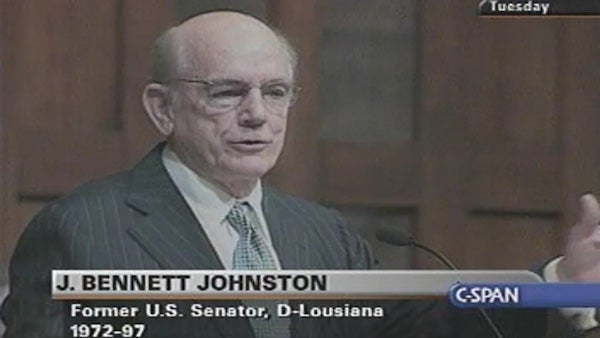Jim Beam column:Yes, the times have changed!
Published 7:24 am Saturday, April 1, 2023

- Former U.S. Sen. J. Bennett Johnston served during a productive time in Louisiana politics and he has some solid thoughts on today's politics.(Photo courtesy of C-Span).
Former U.S. Sen. J. Bennett Johnston’s election to the Louisiana House of Representatives in 1964 marked the beginning of what was to become one of the most productive periods in Louisiana political history. Johnston had the good fortune to eventually serve in the U.S. Senate with the late-U.S. Sen. Russell Long and U.S. Sen. John Breaux, all of them Democrats.
The three senators served at a time when bipartisanship made it possible for them to chalk up major achievements for Louisiana. Johnston, who is now 90, talked about those years during an interview published Monday by The Advocate.
Johnston and Breaux also explained how Democrats and Republicans worked together during those years when he and Breaux participated in the 2007 McLeod Lecture Series. The late-District Judge William “Bill” McLeod for whom the series is named also served in the Louisiana Legislature.
First, some background:
Johnston was elected to the Louisiana Senate in 1968 and to the U.S. Senate in 1972. He served in the nation’s upper chamber for 24 years and was recognized as the nation’s preeminent legislator on energy policy while serving as chairman of the Senate Committee on Energy and Natural Resources.
Although considered a conservative in the Democratic caucus, Johnston took some unusual stands at the time. He broke with his party in 1991 to authorize the use of military force in Operation Desert Storm in Iraq.
Johnston supported the confirmation of conservative Clarence Thomas as associate justice of the U.S. Supreme Court. His concern about climate change was also unusual for conservative members of Congress.
OK, back to what Johnston and Breaux said about their working relationships with Russell Long and Republicans while in Congress.
“The U.S. Senate is the most fascinating and interesting university in the world,” Johnston said in 2007. He said then that he missed the friendships and members of his legislative family.
The two men took members of the audience behind the scenes in Washington, D.C., and talked about their experiences with presidents.
Breaux said it didn’t take rocket science to succeed in Congress. Getting to know your colleagues was the key, he said.
Johnston talked about the good relationship he had with Breaux in his recent interview with The Advocate.
“John and I played tennis together all the time. He did his deal with the Finance Committee, and I did mine,” Johnston said. “I think we brought more projects to Louisiana, more bills passed than anybody in the history of the state.
“I passed legislation in every part of energy: oil and gas, offshore ports, nuclear, nuclear licensing, nuclear waste, the whole thing. And it still survives. The template we passed — two national parks, seven wildlife refuges, with about a quarter of a million acres set aside, hundreds of millions for universities, billions for our ports. Nobody was ever able to do that.”
Johnston was asked how Congress has changed since he left the Senate in 1997.
“Today, people just don’t expect their members of Congress to do anything,” he said. “Do you know anything our senators have accomplished? The times are different. We were very bipartisan in those days. When I chaired Energy, I had the votes of Republicans and Democrats.
“It’s just amazing how you have these tribes now. They don’t speak to each other for the most part,” he said. “We had close friends across the aisle. One of the reasons for that is that they don’t live in Washington anymore.
“(Former U.S. House Speaker) Newt Gingrich came up with the idea that everybody ought to live at home and get their wisdom from a backyard barbecue. What he really had in mind was he wanted to run everything and didn’t want anybody to know anything.
“They didn’t and they don’t. The House members come in on Tuesday and leave on Thursday. How in the world can you expect to understand what’s going on if you’re not there?”
Johnson was also asked how Louisiana politics has changed.
“You probably can’t be elected in Louisiana without being for (former President Donald) Trump or somebody like Trump,” he said. “That is a huge change. The sources of information are so tribal — the left-wingers don’t know what the right-wingers are thinking and why, and the right-wingers don’t know what the left-wingers are thinking. So many people of real intelligence don’t understand why people like me abominate Trump.”
Both former senators in 2007 called public service fulfilling, satisfying, enjoyable, and challenging. Breaux advised young people interested in politics to become involved in other people’s campaigns.





